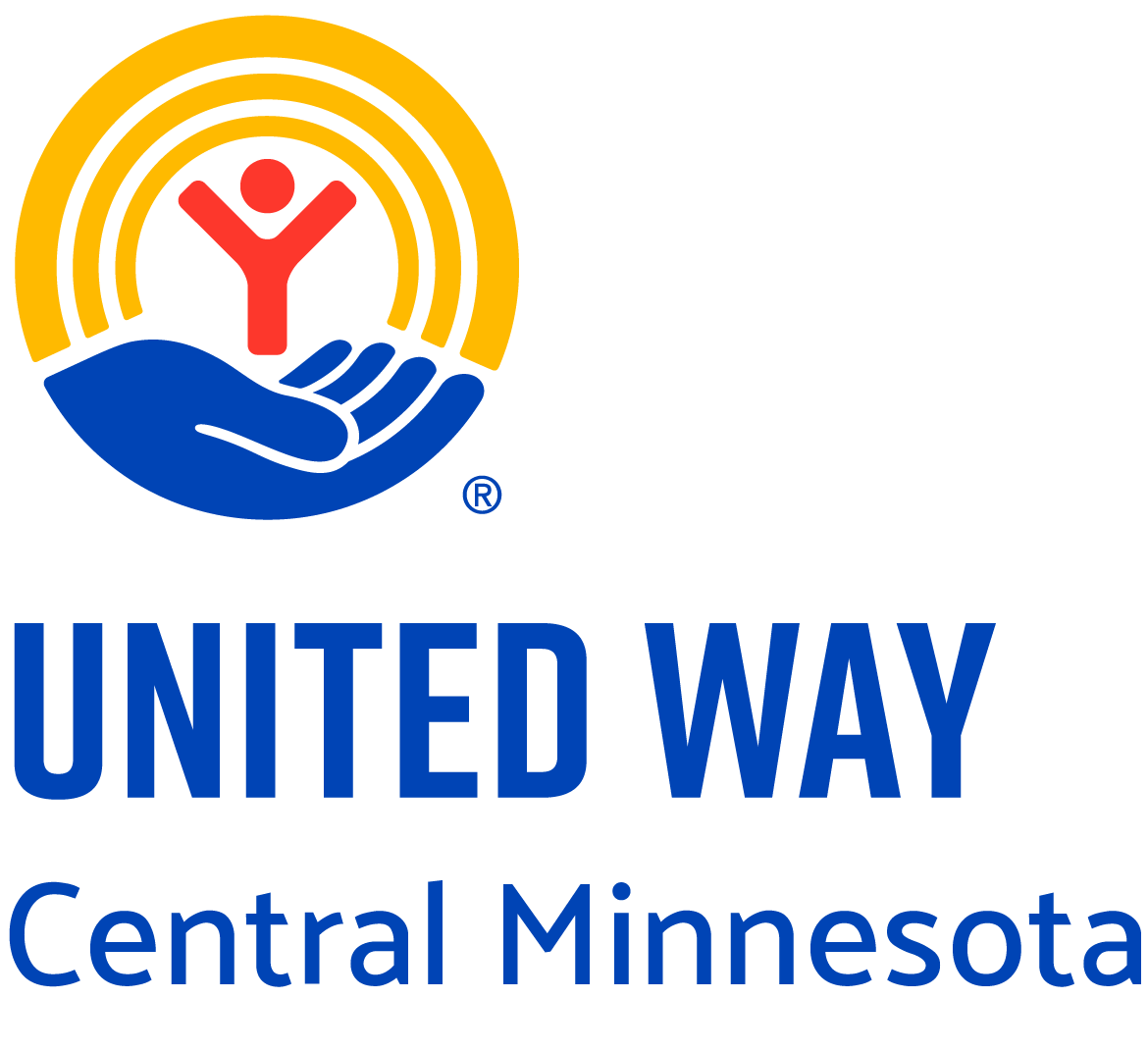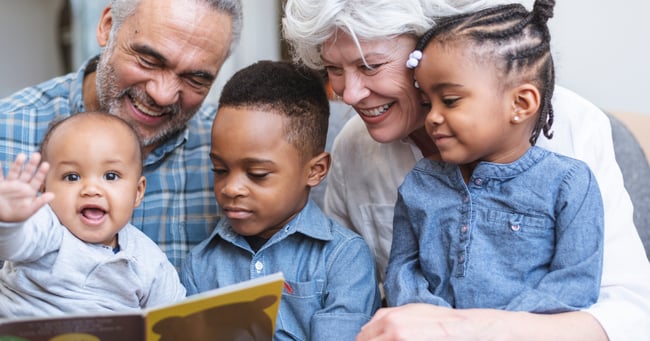United Way of Central Minnesota (UWCM) recognizes the importance of connecting local families and caregivers to opportunities within spaces where early learning unfolds.
At a recent UWCM Preschool for Success Community Support session, children played quietly not too far from their parents, seated on chairs in a semi-circle around Family Engagement Program Coordinator Farhiya Iman. A few shared stories about interactions with their young kids, evoking knowing smiles and nods from others. But this gathering of caregivers served a purpose beyond the casual camaraderie found at a common playdate.
These parents meet regularly to connect and boost their children’s learning in preparation for the start of school. Each family leaves with a learning tool for sharing at home. These tools grow literacy development, the foundation upon which successful learning can move forward and expand. For many multicultural families like those in attendance whose first language may not be English, growing literacy means engaging in everyday conversations with kids and sharing stories, poems and songs aloud. In these ways, young children discover new words, build vocabulary and strengthen emotional bonds with caregivers, preparing them to read and build on learning experiences as they enter school.
Local families say engaging in the sessions helps them support their children. Past group members summed up their experience in a thank-you note to United Way: “You have embraced us on our journey, fostered understanding and advocated for our needs while positively transforming our lives. The support and resources from United Way have been instrumental in our growth as parents, and we cannot express our appreciation enough.”
Networks Match Needs to Resources
UWCM ensures its literacy initiatives make a real difference to local families through the work of many types of groups. Educational leaders and community members make up the Black Youth Network and Somali American Youth Network, aiming to improve student social and academic outcomes. United Way networks offer participants the chance to listen and gather information about family and student needs from each other and then connect those to community programs that seek to resolve issues and offer opportunities to learners. UWCM’s Director of Education Partnerships, Stef Rothstein, explains: “Our work takes what has traditionally been done only in school, and we magnify that outside of a classroom setting. United Way works with programs that serve children and families and have relationships with kids in different ways than schools might have. Through networks, United Way equips, empowers and builds up skills so that members can form even stronger relationships with families and early learners. We know caregivers are a child’s first and often most influential teachers. We give programs that work with them needed tools and techniques and then lean on them to lead and use what is best.”
Getting Books into the Hands of Children
Another way UWCM strengthens literacy development is by getting books into the hands of children early on. Research shows that having more books in the homes of early learners correlates with higher reading scores at school. Nationally, 61% of low-income families have no age-appropriate books in their homes. United Way is working to change that for kids and families in our community. Families may register their children for United Way’s Imagination Library and receive an age-appropriate book sent to their child every month from birth through age five. Since 2005, United Way of Central Minnesota has mailed 1.7 million Imagination Library books into the community and has set a goal of signing up 1,000 new children into the program in 2024. UWCM’s Family Literacy Programming Specialist, Isabelle Joseph, worked to provide access to this program to traditionally underserved children and families during community events and gatherings at which UWCM was present.
Books and Resources That Make A Difference
Rothstein says building a home library with a wide variety of books with different themes, stories and characters from many backgrounds is beneficial in literacy development because this helps readers see themselves in the content, making visualization of new aspirations possible. “There’s a ‘mirrors piece’ when readers develop their positive sense of self as they read about a character and what they are doing. They think to themselves, ‘That could be something that I would be good at,’ or ‘I would love to go on that adventure.’ This element of literacy development is about readers being able to identify with characters and explore new concepts through their own lenses because characters look like them. This gives the reader freedom and permission to explore other cultures and experiences in a story.”
Home libraries advance literacy for all who come into contact with those resources, including family members other than the emerging reader. Rothstein points out that having books around at home helps siblings, grandparents, aunties and uncles—the whole family. UWCM encourages this kind of interaction through support of American Reading Company (ARC) at out-of-school time sites and programs where caregivers and learners meet. ARC helps caring adults assist readers with access to appropriate books and support as they advance in literacy skills. “ARC is less about teaching someone to read, than being able to think about how caring adults engage with learners around reading and literacy,” says Rothstein.
In addition to “supporting the supporters” through ARC, United Way partners with school districts where the Science of Reading is part of the Reading to Ensure Academic Development (READ) Act made through state legislation. A vital component of this act incorporates family engagement as part of literacy development. UWCM is working with the St. Cloud Area School District as they create Science of Reading videos to share as guiding snippets that caring adults may use when supporting students. United Way’s networks are helping to review and refine the first versions of these digital resources.
Early learners and their caregivers may also find literacy-building activities at United Way of Central Minnesota’s Llama Llama Read-A-Rama. This community event at the St. Cloud Great River Regional Library features activities and resources for kids from birth through age 10. Storytime, crafts, activities, visits by community partners, snack time and prize giveaways make this annual gathering a draw for hundreds, giving local kids literacy-focused experiences in an atmosphere that promotes books, learning and reading together.
Essential Engagement
Engagement with one another is the special element that advances literacy for learners, and the importance of being able to read is a human right that helps all of us thrive. Rothstein explains: “Literacy is the key that unlocks so many different pathways for people. Every human being should be able to identify what it is they wish to become through reading, empowering people to be able to navigate systems and advocate for themselves. Reading helps us dialogue with one another and experience new ideas, whether that’s early on or throughout our lives. That power helps whole communities and supports meaningful civic engagement.”
While literacy development is central to United Way of Central Minnesota’s education work, Rothstein says an expanded view is needed. “It’s not just about schools or programs. Literacy development is best when we incorporate all stakeholders, all partners, all learners and supporters in the work. United Way is here to listen and equip people with what is needed for success, and that most importantly includes kids and families. We want to ensure they understand literacy and have the tools and confidence they need to build a strong foundation of learning through reading.”

.jpg)



